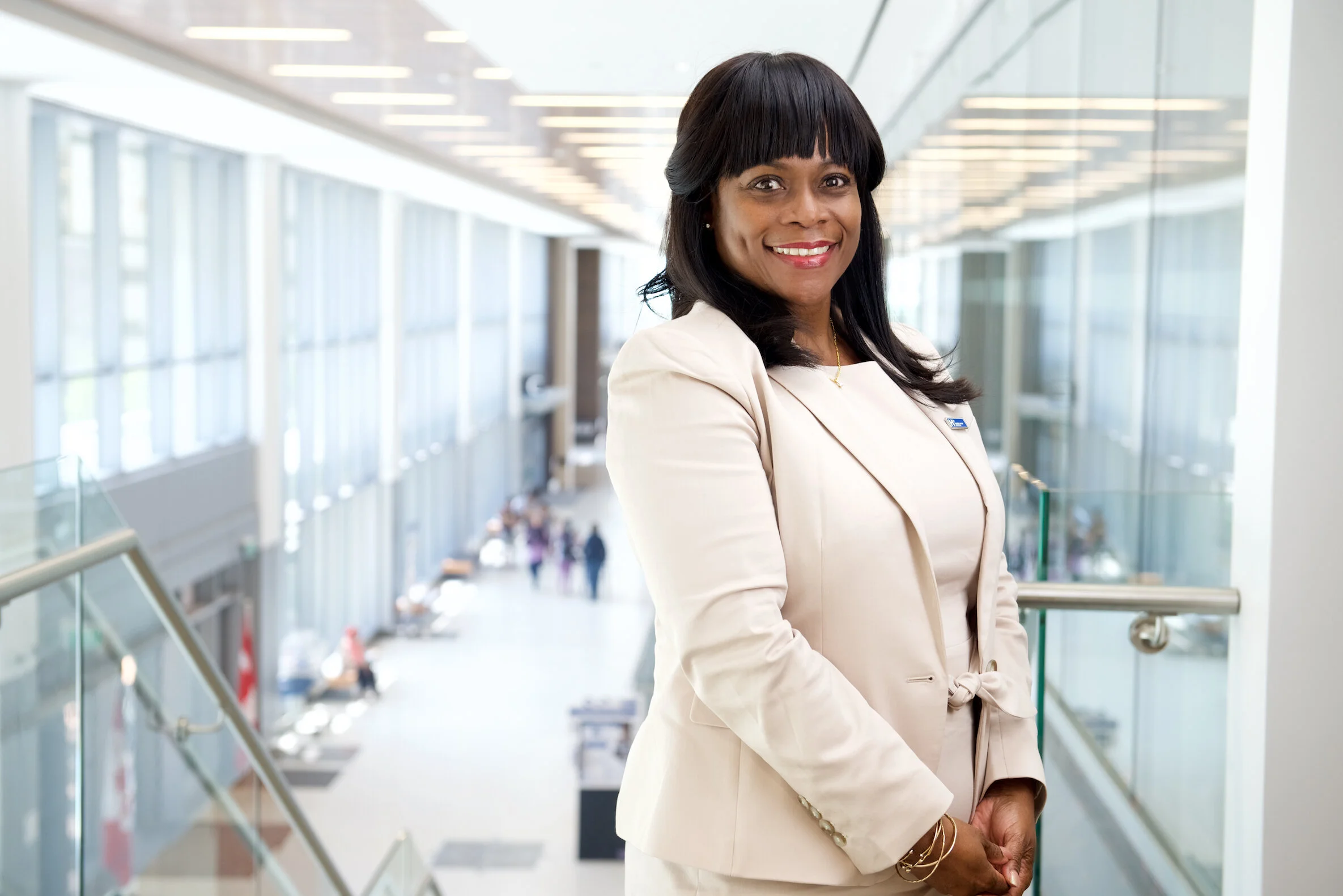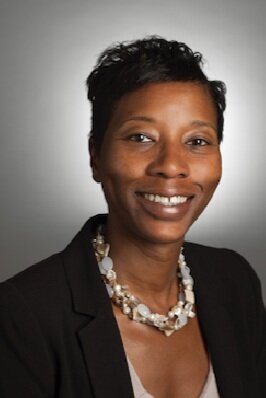Health care leader on the frontline fighting COVID loses mom to the virus
September 18, 2020
Humber River Hospital (HRH) was among the top five medical institutions in Toronto with the most number of positive COVID-19 cases.
As Program Director with responsibility for Critical Care, Cardiology, Respiratory & Oncology, Cecile Marville-Williams worked around-the-clock seven days a week from the start of the lockdown on March 14 to late June as the pandemic raged, claiming thousands of lives across the world.
With the 44-bed ICU unit filled to capacity, she was forced to open a satellite 12-bed unit in the Recovery Room to manage the large volume of COVID cases and other ICU patients.
“In my 38 years in nursing, I have never seen physicians and nurses so terrified because we just didn’t know what this virus was,” Marville-Williams said. “We were looking at the United States and seeing hundreds of people dying daily.”
With the health care leader on the frontline fighting the deadly virus, personal tragedy struck.
Her mother, Claudette Marville, succumbed to the virus on July 4 less than three weeks after being diagnosed.
The older sister of Ovid Jackson, Canada’s second Black Mayor and the first Black politician and first Liberal to win the rural Bruce-Grey-Owen Sound riding in a federal election, was 84.
For Marville-Williams, the pain was sudden and sharp.
“I never thought I would lose my mom and I never thought I was going to lose her to COVID,” said the third of four siblings. “She had a heart condition, so I thought maybe, if anything, it would be to a heart attack.”
The last time Marville-Williams saw her mom, who lived alone, was on Mother’s Day, May 10.
“I was trying to protect her even though she was very vibrant for her age,” she said. “I made sure she had masks and when I took groceries for her, I had on my mask and protective wear. I didn’t want her to go out and be exposed as I was concerned about her age and the fact she had cardiac and respiratory issues.”
Never in her wildest dreams did Marville-Williams expect to get a phone call from her mother saying she was COVID-positive.
After contracting bronchitis, the octogenarian’s doctor suggested she take the COVID test.
Her son, Michael Marville, took her to a testing site at St. Michael’s Hospital.
“When mom called to say she had COVID, I was very shocked,” said Marville-Williams who holds a Certified Health Executive designation from the Canadian College of Health Leaders. “She was very brave and she said, ‘I will do the isolation and I will get through this’. I honestly believed she would have beaten this because there are many people who have survived this virus.”
Two days before the quarantine period expired, Marville complained of feeling unwell.
“When I called, I reminded her that she had two more days to go, but if she wasn’t feeling well, we had to get her to a hospital,” said Marville-Williams. “She said she didn’t want to go and something else that I didn’t pay much attention to. She said, ‘Girl, I think this COVID is going to get me’ and I was like, ‘What are you talking about’? and ‘We are just going to take it day by day’.”
Taken to hospital later that day after her oxygen level dropped to 70 per cent which is alarmingly low, Marville was on a ventilator 12 hours later fighting for her life.
“It was at that point that the nurse in me started to really worry that we were crossing a road that she would not get over,” said Marville-Williams. “I knew the medical director of the ICU Unit at St. Michael’s because he worked at my hospital, so I called to let him know my mom was in his unit. I also called the nurses who kept me abreast of the settings that my mom was on and I remember calling my two sisters and brother to tell them I didn’t think she was going to make it. I knew within the first couple of days it would take a miracle for her to survive.”
Cecile Marville-Williams
Marville-Williams was just two years old when her mother left Guyana to study nursing in England where she was a midwife before coming to Canada in 1974 and working as a registered nurse for 30 years at Toronto Western Hospital.
On many occasions, she went to the hospital to meet her mother and ultimately joined her in the nursing profession.
“I think I went into nursing because it was a career that was portable,” she said. “Growing up, I wanted to be a physician, but I didn’t think I was smart enough. The next thing was to follow my mom’s path. I looked up to her and all that she accomplished and I wanted to follow in her footsteps. After graduating from nursing school, I went to work at the same hospital my mom worked at, starting in the neurosurgery step-down unit.”
The day before her mother died, HRH declared its ICU was COVID-free.
Between March and July, the hospital had 95 COVID patients in its ICU. A total of 47 died.
One of the lucky survivors is Toronto airport employee Delroy Noble who spent 59 days on a ventilator and lost about 130 pounds.
“He had his 30th birthday while he was with us,” said Marville-Williams. “He’s lucky to survive. There are patients as young as him and even younger that we lost. Where Humber is located in the northwest Toronto area, there’s a lot of congregate living, many new immigrants and families living together and not self-isolating. So you saw not one individual getting COVID, but entire families.”
HRH, she said, wasn’t prepared for the virus’ onslaught.
“I was using 8,000 gowns a day in addition to thousands of masks, gloves and even the equipment on a ventilator,” Marville-Williams recounted. “The challenge was a lot of that stuff isn’t made in Canada. The big question at the time was, ‘Will we have enough PPE to manage the volume of patients we had’? We know how to care for critically ill patients, but we worried about not having the right equipment and all the equipment we needed and the fact that we might die on the frontline or take the virus home to our families.”
With most public health experts predicting a second wave of COVID, she said HRH is in a much better position to fight the virus that has claimed over 9,000 lives in Canada in the last six months.
“We have learnt a lot about the virus and are still learning every day,” the health care leader said. “One of the things that really worked with the population of COVID patients we had was prone ventilation which is turning them on their stomachs to try to ventilate their lungs. We know what protective equipment we have to wear and we have put in a lot of protocols. Before the patient really falls off the cliff, we try to intercede earlier and incubate them. My senior team has made sure that we have enough PPE. What we really need is for everyone else to be prepared and to listen to what the experts are saying. If everyone does their part, it will help us to be better prepared and to better treat patients inside until we get a vaccine.”
Completing a Bachelor of Science in Nursing at Ryerson University in 2005 and a Master of Arts in Leadership-Health specialization at Royal Roads University three years later, Marville-Williams spent 14 years at the University Health Network and a decade with Trillium Health Centre where she was the Cardiac Surgery Clinical Educator, Manager of Medicine and the Manager of the Cardiac Surgery ICU and Inpatient Unit.
She joined HRH in March 2011.
Married to Grenadian-born Paul Williams for three decades, the couple has two daughters.
Chloe Williams is a teacher with the Dufferin-Peel Catholic District School Board and Bria Williams has a Master’s in Criminology and represented Guyana, York University and Vaughan Azzurri at soccer.
Away from HRH, Marville-Williams enjoys spending time on a Caribbean beach or in her backyard sipping a glass of wine and listening to 80s and 90s music.
In addition to older brother Michael, she has two other siblings -- Marilyn Punsammy and Che Marville who is a health and wellness advocate.







